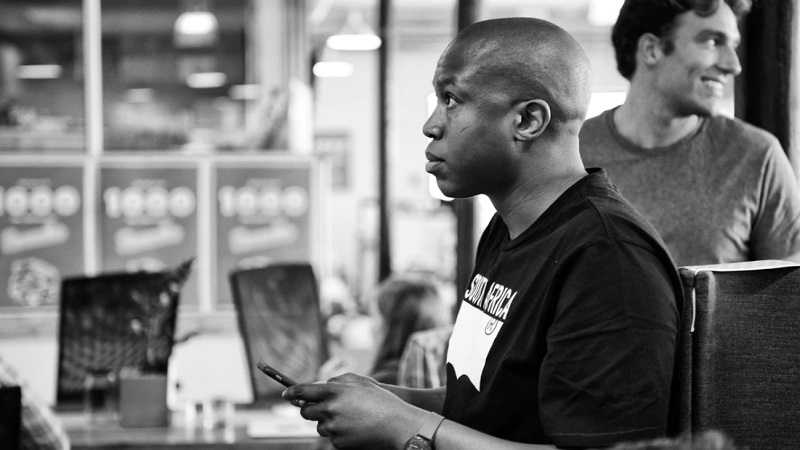In a move that signals a major leap forward in generative AI, OpenAI has quietly rolled out ChatGPT-5, its most advanced model to date….
Yoco had month of capital left in bank before we closed deal – Katlego Maphai

SA fintech startup Yoco was living on the edge in the two years it took to conclude the company’s first funding round, says co-founder and CEO Katlego Maphai.
In a tell-all session at FuckUp Nights Cape Town — held in Cape Town on Tuesday evening (20 March) and hosted by Aspiring Black Leaders and Cape Town Office — Maphai detailed the struggle he and his three co-founders faced before they were able to clinch the startup’s first round of funding.
The deal, which involved an undisclosed amount in a round led by US-based Quona Capital and Netherlands-based Velocity Capital, was announced in March last year.
Read more: Yoco concludes Series-A funding round, plans international expansion
“The time leading up to that was really, really tough. There were moments where we literally had a month of capital in our bank account. We were just raising angel and family office money to allow us to continue,” says Maphai.
It took Maphai and his team two years before they were finally able to conclude what was their first, Series-A funding round.
There were moments where we literally had a month of capital in our bank account, says Katlego Maphai of time before Yoco clinched first funding deal
After a brief career in management consulting and as a venture builder with Rocket Internet, Maphai founded the startup in 2015 with Lungisa Matshoba (who studied together with Maphai), Bradley Wattrus (who he worked with at Rocket Internet) and Carl Wazen (a former consultancy colleague).
It was in late 2012, that the four first began working on the idea for the startup — how to make it easier for small businesses to accept manual credit card payments. The four then spent a full year trying to get a license to operate.
“We literally packed up our bags and moved to Johannesburg to do that. We were self-funded and really before the end of this period we could have been told that ‘you are not getting the license’ and we literally could have failed before we even started. And psychologically that was really tough,” recalls Maphai.
After they were able to secure a license to operate as a payments company, the four moved back to Cape Town, where they were able to get their first angel funding. About a year later, in late 2014 the company went live with its first customers and decided to hunt for a Series-A round.
How we ‘stuffed up’
“Really it was here that we really started to stuff up. We, in our minds had been operating for two years, but in truth the company had only been operating for two months. And we went out to the market to try raise capital and it was a complete disaster,” he admits.
Linked to this, the four had made promises to their staff of salary increases. But instead of focusing on acquiring customers and helping SMEs, the four were focused on trying to close the funding round — by aiming to drive up client volumes by signing up larger businesses, for example.
“If I go back to this period, the 2015 period, we were just taking fund raising meetings. It was not working out. We were getting rejections. If we weren’t getting rejections we were getting really nasty pricing on our (funding) round,” he says.
But he says in the end those tough times had a positive effect on the business.
“This really toughened us up, really got us to understand like what drives this business. And also amazingly within the process we really got on track with our mission, which is to support smaller businesses,” he says.
Out of this the four developed a key metric — to track first-time card acceptors. Today, for 75% of the company’s 20 000 card machine users, it is the first time they have ever accepted physical card payments.
The company is now raising a Series-B funding round, to assist the company to expand into new markets internationally.
‘Knew nothing in beginning’
Maphai points out that when the idea for Yoco was born, the four knew little about the payments sector.
“We knew shit about the payments industry, when we started. We spent most of the early days identifying experts within the industry, finding them and taking (them for) coffee, building up those relationships,” he says.
What also helped was assembling an advisory body made up of the right experts, says Maphai.
“There were no ways we would have gotten that license to operate without that. They weren’t even looking at us. They were looking at our advisors and the fact that the advisors said ‘these guys know what they are doing’,” he says.
And what does it take to be a leader? It’s the ability to think long term, says Maphai. “What I’ve found is that when you think in those horizons and when you condition your mind to those horizons, your perspective on whatever is going wrong and right completely changes. You see it as a ripple and not as this big sort of amplitude that is going to last forever.”
Says Maphai: “When you have that perspective you are able to have belief. And when you have belief you can constantly infuse that into your team.”
Featured image: Yoco CEO Katlego Maphai via Yoco.

